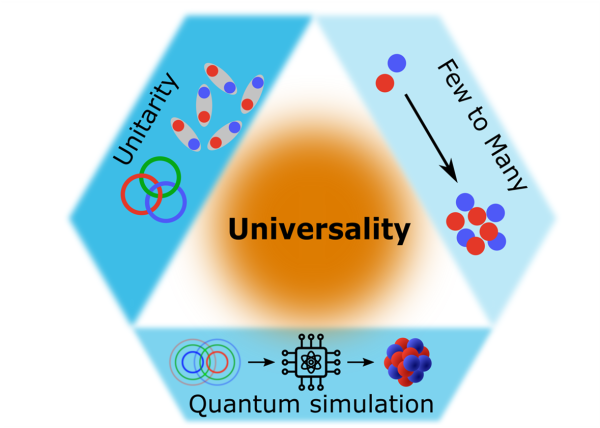Quantum Few- and Many-Body Systems in Universal Regimes

Event ID: INT-24-3
Note: This is a 5-week in-person program with an embedded "hybrid" workshop during the third week (October 21-25).
Disclaimer: Please be aware that, due to ongoing concerns regarding the COVID-19 pandemic, this program may be changed from in-person to hybrid, or to online-only if necessary.
Quantum few-body systems play a critical role in advancing our fundamental understanding of Nature and have long been an inspiration for the development of transformational theories, foundational computational methods, high-precision experimental techniques, and technological innovations. This scientific and technological discovery is rooted in the enhanced interdisciplinarity of research into the physics of few-body systems, where the emergence of universal phenomena connects seemingly disparate nuclear, atomic, molecular, optical, and condensed matter systems across vastly different energy scales. Few-body science is also a vibrant and fertile ground for the development of quantum information technologies and the application of emerging quantum computing and quantum simulation platforms to the simulation of microscopic systems.
The goal of this program is to bring together experts from the nuclear physics (NP), atomic, molecular and optical (AMO) physics, and quantum information science (QIS) communities to foster interdisciplinary research, advance discovery into the physics of quantum few- and many-body systems and explore challenges and opportunities in the application of emerging quantum technologies to the simulations of low-dimensional and few-body systems. In particular, we plan to focus our discussion on the following topics:
1.) From Few to many: Explore how the emergence of universality can be used to bridge the methodological gap between few- and many-body systems, particularly in the context of complex dynamical processes important for the study of exotic nuclei at radioactive beam facilities and the understanding of recombination processes in ultra-cold gases.
2.) Systems at unitarity and universality: Identify new ways of exploiting experiments with ultra-cold atoms to understand the properties of nuclear/neutron matter and neutron stars that cannot be experimentally addressed.
3.) Quantum simulations of low-dimensional and few-body systems: Revitalize and expand this community by creating awareness and excitement on its connections with quantum information science (QIS) and technology, and on the opportunities and challenges offered by the application of near-term quantum computing platforms to the description strongly interacting systems and their dynamics.
PROGRAM FORMAT
Given the fairly compact duration of the program, we envision that we will have seminars on at least two of the three key topics every week. The tentative schedule is outlined below, though the final program will depend on availability of participants.
- Weeks 1-2: Classical and quantum simulations of few- to many-body systems
- Week 3: Workshop on ‘Intersections of cold atoms, nuclear physics, and quantum simulation’
- Weeks 4-5: Universality in atomic and nuclear systems, ultra-cold gases, and neutron matter
There will be a $70 registration fee to attend the embedded workshop week (October 21-25). The registration fee covers participation in the workshop, lectures, and coffee breaks. Details on how to pay the registration fee will be sent via email to all workshop attendees.
